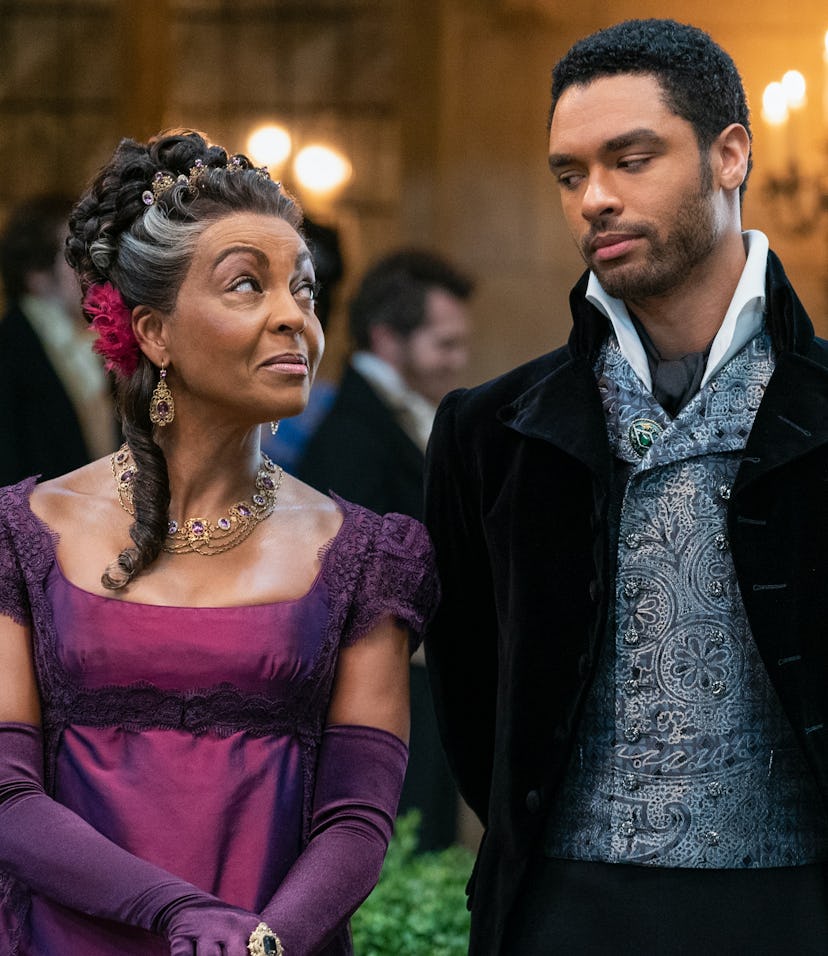Entertainment

Lady Danbury On Bridgerton Redefines What It Means To Be A Mother
Being a mom is so much more than giving birth
Editor's Note: The article below contains spoilers for Bridgerton on Netflix.
There are lots of reasons to love Netflix's hit new show Bridgerton. The melodramatic romance! The beautiful costumes! The ridiculously handsome Regé-Jean Page as the Duke of Hastings! But, in many ways, it's also a show about motherhood — from the "vulgar mamas" of the ton eagerly pushing their daughters to marry well to Daphne Bridgerton's desire to have a family. But among all the mothers, Lady Danbury on Bridgerton (played by Adjoa Andoh) stands out. Not only does she redefine what it means to be a mother, but she serves up a master class in how to parent.
On the surface, this character does not instantly strike one as maternal. For starters, she's not actually anyone's mother. She's also an acerbic, larger-than-life woman whose assertiveness borders on (and often creeps into) flamboyance. Her commanding presence and overt intelligence is a breath of fresh air in a world of demure, swooning debutants. Even the rakish (and again, I cannot stress this enough, stupidly gorgeous) Duke of Hastings, aka Simon, finds himself begrudgingly obeying her.
Lady Danbury shows us that being a mother isn't about giving birth to someone, nor dictating a child's personality or destiny.
In the second episode, we see the true nature of Lady Danbury's relationship with Simon, which until now has been obviously close but somewhat murky. We learn (in a flashback) that she was present at his birth, which is followed swiftly by the death of his mother, her best friend Sarah. When Simon's father all but abandons him, believing the child to be an "imbecile" due to a pronounced stutter, Lady Danbury takes him into her care, vowing to help him overcome his "impediment."
Years go by, and Lady Danbury delivers on her promise. But when Simon's father, unimpressed with the boy's progress declares him "my worst failure," the lady's eyes flash. It's a look any mom knows instantly, equal parts anger, protectiveness, and the heartache of knowing your child is in pain. Maternal rage. It doesn't matter that she didn't give birth to this kid: she is his mother. She loves him with a kind of ferocious pride that lets his horrible father know "I've got this even if you don't — we don't need you." Even if they never call each other "mother" or "son," these are the roles they play in one another's lives, not out of consequence of birth or obligation — it comes from that visceral, powerful love.
We have more insight into Lady Danbury's parenting style in a conversation with Daphne Bridgerton. Reflecting on Simon's childhood, she recalls, "I merely showed him what he was capable of all along. And if he needed some encouragement, a push from time to time, that is something I was happy to provide. But at the end of the day, the Duke's triumph was his and his alone. It had to be."
It can be easy to see motherhood as knowing what's best for your kid and dictating they do just that. Indeed, it's the modus operandi of most of the mothers on Bridgerton. Lady Featherington plots and schemes and dresses her daughters up as her Mini-Me's. The various unnamed mothers of the ton are forever shooing their daughters into socially advantageous courtships. Even kindly Lady Bridgerton regularly prompts her son Anthony to be more like his father. But Lady Danbury knows that the best moms of adult children never tell their children what to do, even when they obviously know what's best. They can make it clear what they think they should do (and she does; see also Simon's marriage to Daphne), but ultimately, she knows that anything important must come from within.
Lady Danbury shows us that being a mother isn't about giving birth to someone, nor dictating a child's personality or destiny. It's about being the one who can honestly and truly see a child for who they are and helping them find the confidence and courage to realize what they are capable of.